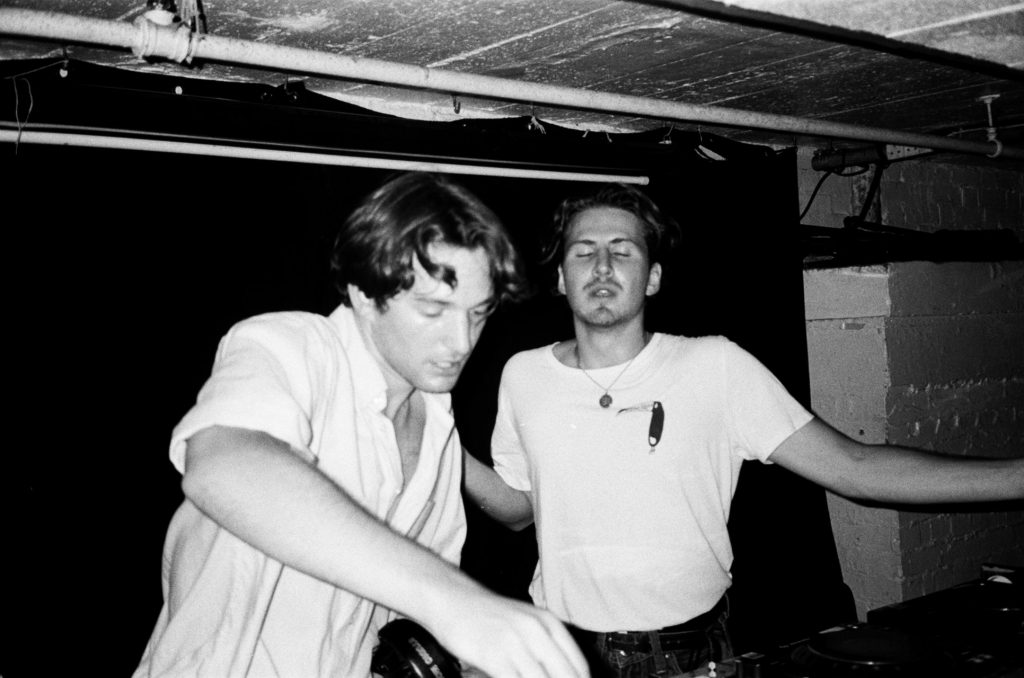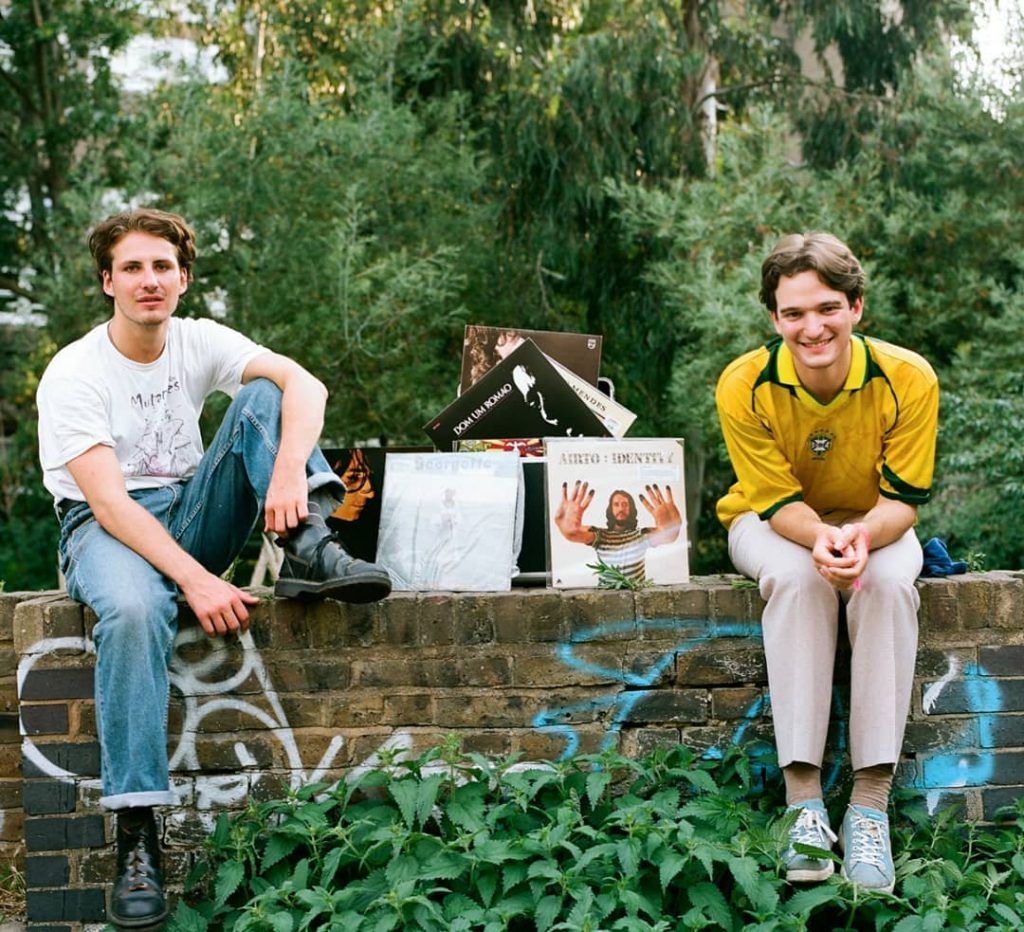The Long Read: Caipirinhas and Cultural Cannibalism – in conversation with Brazilian Wax

Brazilian Wax began in Leeds as a student radio show, hosted by Henry Weekes and Joe Osborne. The show tugged on the threads of Brazil’s tangled and turbulent history, illuminating the rich and complex relationships between its diverse cultures, politics and art. Records from Brazil’s music legends would be interspersed between skits to add vibrancy, colour and context to the sound of the South American behemoth.
Joe and Henry have come a long way since then. Both leapt at the chance offered to them by local Leeds night curators LOOP, to turn their small radio show into a DJ project. Nowadays, they aren’t just pulling on the entangled lines of Brazil’s past, they are making a solid effort at unravelling them altogether. The project has snowballed, allowing the DJs to mix and spin the wax of Brazilian records to exuberant audiences in venues and festivals throughout the country. From fusing the subtly subversive creations of Tropicalia to the raw force of North-Eastern Afro-Brazilian Batucada, to the modern edge and aggression of the country’s ever-urbanising club scene, the project of Brazilian Wax aims to cultivate a sound that incorporates all of Brazil – and give you a good boogie while they are at it.
As they increased their name ID and garnered connections, Joe and Henry have been able to collaborate with labels and collectives who have been instrumental to the global dissemination of Brazilian music, as well as some of their own personal inspirations. Their nights have hosted the likes of Nubya Garcia, Mafalda and Aroop Roy. Brazilian Wax’s 2020 tour will see them reach deeper into Sao Paolo’s party scene than ever before by playing with a co-founder of the influential Selvagem party collective and head of the Selva Discos label, Trepanado.
But as we sit together now, slouched on my living room floor with Caipirinha’s in hand, the duo falls right back into a mood reminiscent of their early radio days. Between jokes and gaffs, Joe and Henry slip seamlessly through talking about their inspirations, perceptions of Brazilian art, history and culture, as well as their own experiences of being mediums for its transmission. Both also talk fondly of the importance of those who have dedicated a large portion of their lives to uncover records from Brazil and bring them to the UK, especially the work of Mr. Bongo. Henry enthuses:
“I cannot overstress the importance of it, all the songs we play from Brazil have come from Mr. Bongo; you know, they put so much time into uncovering this stuff and have essentially spent their life collecting this music. And they aren’t just throwing this music together, they curate incredible compilations that DJs can draw on. I keep coming back to Number 5 [‘Brazilian Beats 5 – CD’], the one with Marcelo D2’s tracks on it [‘Pilotando O Bonde Da Excursão’ and ‘A Maldição Do Samba’] which is just a dozen tracks that I never know where to place, but the grooves just sound like Brazil – these tracks bang.”
The pair played with Mr. Bongo in October 2019. However, it is clear that the influence of the Brighton based record label on Brazilian Wax goes far beyond just the music it puts out. Joe and Henry want their project to emanate the understated way in which Mr. Bongo tirelessly seeks out new and unfamiliar sounds to highlight for global audiences. Joe explains: “the important thing is what you are giving a platform to and things like Mr. Bongo are brilliant and always self-effacing – people don’t know the names of anyone involved with them – you don’t know what you are getting beyond the fact that they are an anonymous brand giving you music from Brazil – there’s a lot to be said for that.” Joe continues to explore and explain the duo’s philosophy: “I think it’s a Brazilian Wax opinion that DJing should be about the music you’re playing, rather than the DJ who is playing it. We vaguely know the names of the people in Mr. Bongo, Joe Davis for example, who runs Far Out Recordings, is a legend as a DJ. But it’s not about them at all.”

Joe mused about the role of the DJ, “It isn’t important if you are this rare vinyl digger or not, the important thing is that you’re playing un-heard records. You’ve created this platform where people can hear this obscure and un-found music – in the same way as the Tahira compilation is, which is now played worldwide.”
Tahira collaborated with Brazilian Wax back in the Summer of 2019 and is another DJ who has played a large role in the global dissemination of Brazilian sounds, especially those from the more politically and economically marginalised areas of Brazil’s North East. Joe explains that “he is a music digger and a researcher as much as he is a DJ… He did lots of research into record archives of sounds that had been recorded in the North East and then made a compilation of the tracks. ‘Levanta Poeira’ [‘Kick up dust’], came out a few years ago. The collection is all Afro-Brazilian in origin and the tracks were completely unknown until he uncovered them – it’s unbelievably important for DJs worldwide”.
Henry chimes in: “Tahira’s compilations are so important because it fights against the exoticism that Brazil is stereotyped for. You know, in western culture Brazil is often sold as an image consisting of Rio, Sugar Loaf mountain and Ipanema beach – but this does not represent the country at all. It’s looking at the London eye, Tower Bridge and Big Ben and thinking that they represent the whole of England.”
To some extent, Joe sees Tahira’s work as a defiant response to President Jair Bolsonaro, whose brand of populism has sought to demonise Brazil’s black, indigenous and immigrant populations, as well as the LGBTQ community. Joe reflects “In a country whose main two cultural exports are football and music, there is an argument that Tahira is really internationally important for the representation of Afro-Brazilian and immigrant communities in Brazil.”
In fact, Joe sees the veering to the right of Brazilian politics as having triggered a response from Brazilian artists and civil society akin to that of the resistance which emerged under Brazil’s military dictatorship (1964–1985). The Tropicalia movement in art and in music was widely seen as a protest against the military’s crackdown on the freedom of expression and was led in part by two Brazilian music greats, Gilberto Gil and Caetano Veloso. Joe continues “You know, Bolsonaro openly pardons the dictatorship and is dripping with a conservative nostalgia of how things used to be.”
For Joe, the current crop of defiance and subversion in the Brazilian music scene comes from DJ collectives and bands such as Mamba Negra, Gop Tun and Teto Preto. The latter’s 2016 release, ‘Gasolina’ was seen as an expression of anger and discontentment with Brazil’s political trajectory, which would ultimately end in Bolsonaro coming to power. ‘’Oh yeah, the tune also bangs’’, Henry adds. Joe further details the commonality that links a lot of these groups together – “while they pull things from Brazilian culture and Brazilian music, the sounds they produce do not necessarily sound stereotypically Brazilian, which I think is really important for Brazilian club culture, because as an aesthetic, this in itself is subversive, in the same way that Jorge Ben was vilified for using an electric guitar in the 1960s – he was seen by conservatives as de-purifying ‘Brazilian music’ with ‘American culture.”
It is clear that Henry and Joe want to situate Brazilian Wax within this new scene that avoids dwelling with rose tinted glasses on the romanticism and exoticism of the past. ‘’I don’t want to exoticise Brazil, I don’t want it to seem like it is a place which is only colourful and fun and friendly and a laugh, because it’s not. And it would be doing the country an injustice if we just played stuff from the 70s and 80s, because that’s not the country it is today’’ Joe claims. Henry agrees, “It would be like going to a UK night in Sao Paolo where they just played Barry Gibb as their representation of funk and soul – I mean, don’t get me wrong, I’d still have a good time, but this is not what a British night sounds like.’’
In the closing of our conversation, the members of Brazilian Wax reflected on just how far they’ve come in the past few years. Joe reminisces about the first night they played, “we had all of the notes of our set down to the milliseconds – when we should turn a button or change a song’’.
Now however, Joe and Henry have amassed an abundance of tracks to delve into each time they get behind the decks. They have also diverged in their influences and preferences, resulting in complimentary and clashing sounds. Joe explains, ‘’It’s actually such a joy finding these clashes which only add to the ramping up of something, say if Henry is playing a Batucada heavy percussion track and I go from there into a more modern deep house kind of thing, the drums of the Batucada and the thumping of the house create a new interesting thing , there is a cross rhythm there’’.
The blend of genres, cultures and eras in Brazilian Wax’s sets, is reminiscent of what Brazilian poet Oswald de Andrade called ‘cultural cannibalism’. Henry explains it as the idea that ‘’Brazilian nationalism is inherently outward looking and is continually reconstituted by its devouring of other cultures that it comes into contact with.’’ As Brazil’s musical scenes and tastes continue to convulse and oscillate in this turbulent time, so Brazilian Wax’s sound will evolve – though the latter is always guaranteed to make you dance.
Check out Brazilian Wax’s new mixes: Música Macondo, Tuckshop Music,and Niceolation Livestream. They will be releasing new mixes in partnership with DICE over the coming months.
Find out more from the Brazillian Wax website, Facebook, Mixcloud and Instagram pages for updates, future events and livestreams.
Filed under: Music
Tagged with: brazillian, brazillian wax, Culture, DJ, interview, long read, mr bongo, music, tahira, tropicalia



Comments